
Faculty Learning Communities

What is a Faculty Learning Community?
A faculty learning community is a group of cross-disciplinary faculty (usually 6–12 people) engaging in an active, collaborative program that meets regularly to support each participant's professional development (definition adapted from Miami University, OH). Depending on the chosen book, learning community participants may pick a focus project and agree to apply the ideas, try out innovations, and report back to the group on what they have learned.
The Center for Faculty Development provides you with a copy of the book, refreshments, and a designated “host” for your learning community. At each gathering, you’ll discuss key insights from the assigned reading, questions that arise for you while reading, and, when appropriate, the progress you're making on your own project.
Who can join?
Any Seattle University faculty member, part-time or full-time, can participate in the program.
Fall 2023
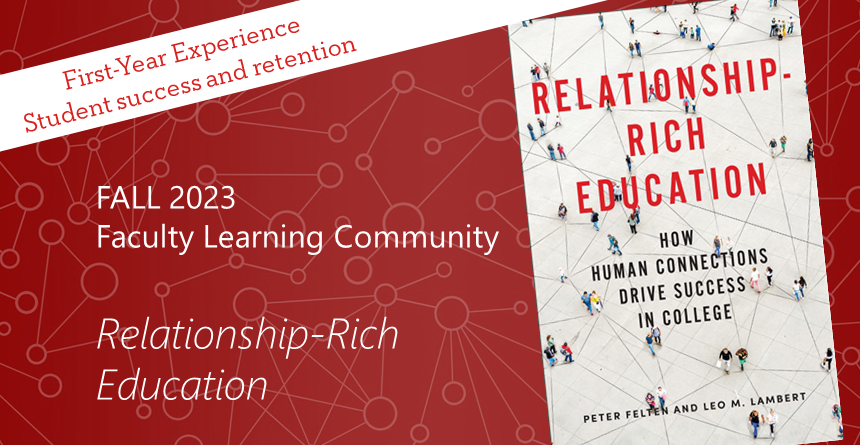
-
23FQ FLC Relationship-Rich Education - details
-
Faculty Learning Community
Relationship-rich education: How human connections drive success in college
Tuesdays: Oct 24, Nov 7, and Nov 28 | 11:00–12:15 | In person | Casey 515 | Coffee, tea, and snacks provided
Facilitated by Hilary Hawley (Director of First-Year Academic Engagement)
What can we do to boost our students’ sense of belonging and success in the classroom? What practical steps can make a difference? And how can we best support our growing number of students from first-gen and underrepresented backgrounds?
In Relationship-Rich Education, authors Peter Felten and Leo M. Lambert demonstrate that human relationships form the foundation of learning, belonging, and achieving in college, and they place special emphasis on the classroom: “the single most important site for students to experience welcome and care, to be inspired to learn, to build webs of relationships, and to ask questions of meaning and purpose” (p. 80).
The authors share stories from campuses large and small, in-person and virtual, to show how faculty have been able to make positive adjustments to their teaching to support both faculty-student and student-student relationships and mentoring.
Significantly, they note that while designing for welcome and inclusion is good for all students, relationship-rich education is especially beneficial for students on the margins of higher education, including first-generation students, BIPOC students, and LGBTQIA students.
In this three-session learning community for faculty, facilitated by Hilary Hawley (Director of First-Year Academic Engagement), you’ll read through the book with colleagues and explore questions both transformative and practical to your work as an educator.
Who is it suited to?
This community is open to all faculty looking to make concrete shifts in pedagogy and practice. Faculty
who regularly engage with first-year students are particularly encouraged to apply.15 places are available on a first-come, first-served basis.
Relationship-Rich Education is 160 pages long, and the reading will be split across the three sessions to be manageable for participants.
What are the dates?
This learning community meets in Casey 515 on:
- Tue, Oct 24 | 11:00-12:15
- Tue, Nov 7 | 11:00-12:15
- Tue, Nov 28 | 11:00-12:15
Tea, coffee, and snacks will be provided at all sessions.
- Register by 9:00 am on Wed, Oct 11
Winter 2024
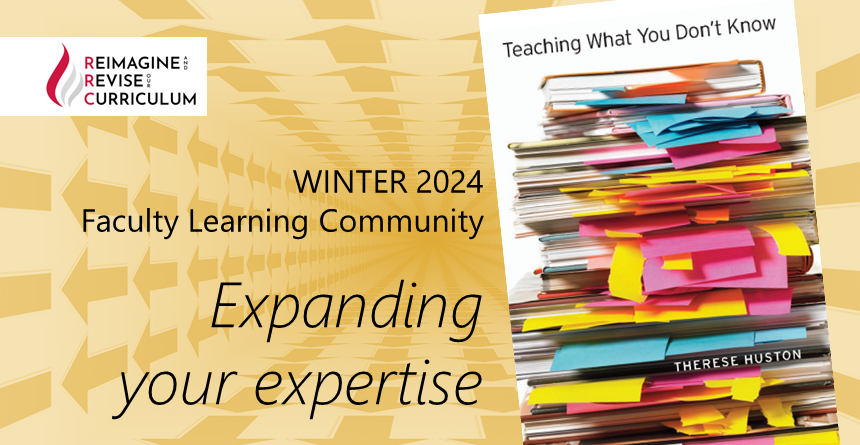
-
24WQ FLC Expanding your expertise - details
-
Faculty Learning Community
Expanding Your Expertise
Mondays: Jan 29, Feb 12, and Feb 26 | 12:301:45 | Via Zoom | Zoom link provided upon registration
Facilitated by Brenda Bourns (Biology)
As we Reimagine and Revise our Curriculum, many of us are realizing that we’re going to be teaching exciting new courses and topics. Sometimes, those topics dip into wells of prior knowledge that may need a little dusting off and brushing up from our days as grad students. But for many of us, these are going to be brand new areas – ones that ask us to expand and enrich our existing expertise to develop new areas of strength in our knowledge and teaching. So how do we get there?
In this learning community, facilitated by Dr Brenda Bourns (Biology), we’ll be guided by the work of Therese Huston, founding director of Seattle University's Center for Faculty Development, and her book Teaching What You Don’t Know. Through dozens of interviews with faculty across North America, Huston firstly establishes that teaching outside our expertise is the norm in higher education, not the exception. She then offers us creative strategies for dealing with typical issues related to teaching new subjects. How can you prepare most efficiently for a new course or a new area? How do you look credible? And what do you do when you don’t know how to answer a student’s question?
Encouraging us as faculty to think of ourselves as learners rather than experts, Huston points out that authority doesn’t come only, or even mostly, from perfect knowledge. She offers recommendations and examples for introducing new topics in a lively style, for gauging students’ understanding, for reaching unresponsive students, for planning your class so that you’re not overworked all the time, and – yes – for dealing with those impossible questions.
Over the course of three sessions, you’ll read through the book with colleagues and explore questions both transformative and practical to your work as both a learner and an educator in the process of expanding your expertise in your teaching.
Who is it suited to?
This community is open to all faculty who will be teaching new topics or new courses as part of the reimagined curriculum. No matter what level of students you teach – undergrad, grad, law – and whether in-person or remote, this series is suitable for you.
15 places are available, on a first-come, first-served basis.
Teaching What You Don’t Know is 263 enjoyable pages long, and the reading will be split across the three sessions to be manageable for participants. And if you choose to read the footnotes, you’ll find that the text even sparkles there, too.
» Register by 9:00 am on Fri, Jan 19th
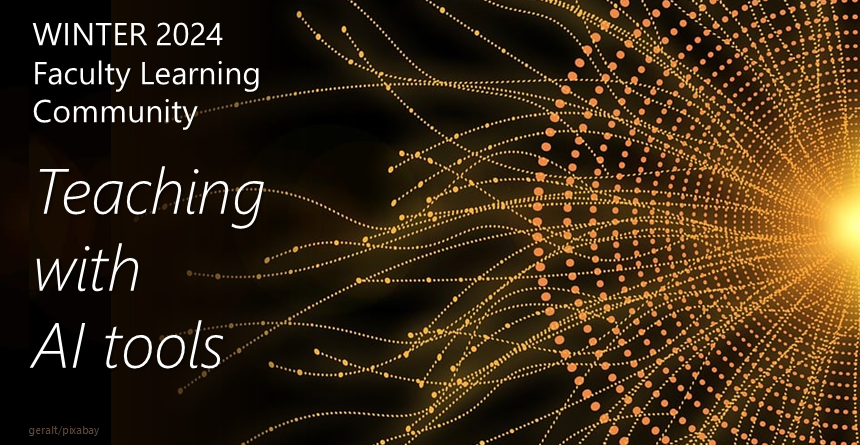
-
24WQ FLC Teaching with AI tools - details
-
Faculty Learning Community
Teaching with AI tools
Tuesdays: Jan 30, Feb 13, and Feb 27 | 2:00–3:15 | Via Zoom | Zoom link to follow
Co-sponsored by the College of Science & Engineering
Facilitated by Onur Bakiner (Political Science)
For the past year, higher education around the world has been grappling with the implications of generative artificial intelligence (AI) on teaching and on students’ learning. In that time, new AI-powered educational tools have emerged and been promoted, leaving educators simultaneously excited and nervous. And as AI capabilities expand, we are presented with new opportunities – and at times new quandaries – to consider.
Knowing that our students already have access to generative AI, how do we work with AI tools for instruction and assignment design, and how do we help our students learn to do the same?
In this three-session learning community, participants and facilitator will be co-learners exploring the potential of working with AI tools in teaching and learning, as well as sharing their experiences to date – and potentially trying out some new ideas and reporting back.
In preparation for each of the three sessions, you’ll read or listen to some online materials so that the conversation can start from a shared understanding.
Who is is suited to?
This community is open to all faculty interested in exploring how they and their students can work WITH AI tools as part of the learning process at any educational level.
20 places are available, on a first-come, first-served basis.
» Register by 9:00 am on Thu, Jan 25th
Spring 2024
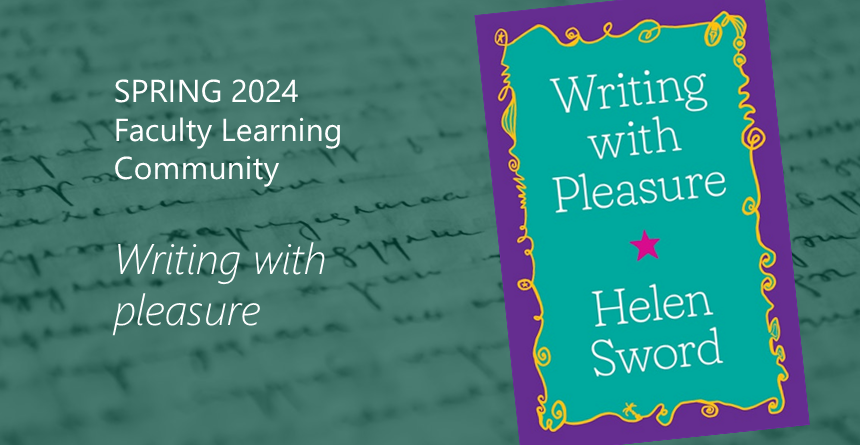
-
24SQ FLC Writing with Pleasure - details
-
Faculty Learning Community
Writing with Pleasure
Narratives in the Academy often describe writing as a painful chore, rather than the pleasurable challenge we might all hope for. As an antidote, Helen Sword’s Writing With Pleasure empowers us – whether our writing is academic, professional, or creative – to reframe our negative emotions about writing and reclaim positive ones.
Ever a fan of mnemonics, Sword invites us to step into our “WriteSPACE”—a space of pleasurable writing that is
- Socially balanced,
- Physically engaged,
- Aesthetically nourishing,
- Creatively challenging, and
- Emotionally uplifting.
To do this, Sword weaves together cutting-edge findings in the sciences and social sciences with compelling narratives gathered from nearly six hundred faculty members and graduate students from across the disciplines and around the world.
In this three-session Learning Community, facilitated by Naomi Hume (Art History), we’ll work our way through the chapters of the book, exploring research-based principles, hands-on strategies, and creative “pleasure prompts” designed to help us ramp up our productivity and enhance the personal rewards of our writing practice, no matter whether we’re writing a scholarly article, an administrative email, or a work of fiction.
Who is it suited to?
This book may be especially suited to early career faculty, as well as to faculty who are seeking to reboot their approaches to their academic, professional, and personal writing.
Writing With Pleasure is 256 pages long, including illustrations by prizewinning graphic memoirist, poet, and academic Selina Tusitala Marsh. Reading will be split across the three sessions to be manageable for participants.
What are the dates?
This learning community meets via Zoom on:
- Fri, Apr 12 | 11:00–12:15
- Fri, May 3 | 11:00–12:15
- Fri, May 24 | 11:00–12:15
» Register
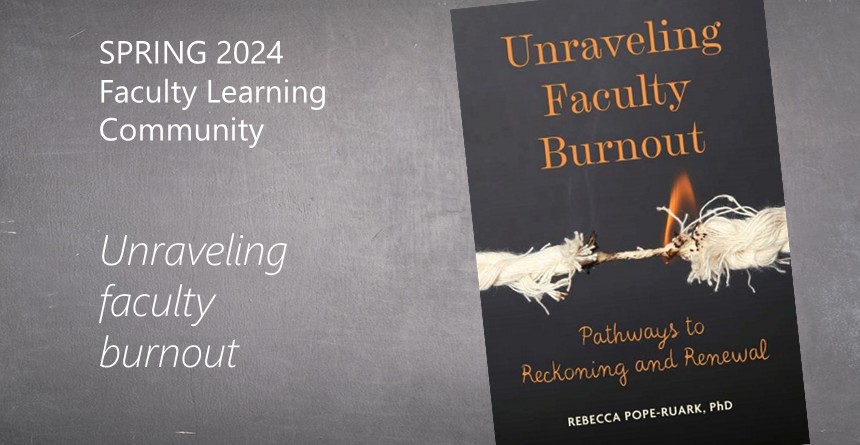
-
24SQ FLC Unraveling faculty burnout - details
-
Faculty Learning Community
Unraveling faculty burnout: Pathways to reckoning and renewal
In an academic culture that values productivity, competition, and external recognition, it is unsurprising when faculty find themselves stressed, overwhelmed, and weary. Left unchecked, these feelings can lead to burnout, characterized by energy depletion, work-related apathy or cynicism, and feelings of inadequacy.
In this learning community, we will read Unraveling Faculty Burnout, a book by Rebecca Pope-Ruark, who explores how we can reframe our experiences and conversations to mitigate burnout, specifically addressing the stressors unique to female and female faculty of color. From the book:
Pope-Ruark “helps faculty not only address burnout personally but also use the tools in this book to eradicate the systemic conditions that cause it in the first place. As burnout becomes more visible, we can destigmatize it by acknowledging that women are not unraveling; instead, women in higher education are reckoning with the productivity cult embedded in our institutions, recognizing how it shapes their understanding and approach to faculty work, and learning how they can remedy it for themselves, their peers, and women faculty in the future.”
In this three-session Learning Community, facilitated by Samantha Hoang (Mechanical Engineering) and Michelle DuBois (Biology), we will discuss strategies and practices to counter burnout. In this space we invite faculty to engage in open and honest conversations about academic culture that often asks us to hide our failures, lulls, and periods of low productivity.
What can you expect?
Over the three sessions, you'll learn about the “four pillars of burnout resilience,” as discussed in the book:
- Re-discovering your purpose and sense of meaningful work
- Practicing compassion for yourself and others
- Deepening connections with peers and mentors
- Re-establishing realistic balance through self-care and setting boundaries
Who is it suited to?
This learning community is open to all faculty, though the book's author tends to focus on female faculty and female faculty of color.
Unraveling Faculty Burnout is 256 pages long, and reading will be split across the three sessions to be manageable for participants.
What are the dates?
This learning community meets in person on:
- Thu, Apr 18 | 2:00–3:15 | Wismer Center (LOYA 200)
- Thu, May 2 | 2:00–3:15 | Wismer Center (LOYA 200)
- Thu, May 16 | 2:00–3:15 | Wismer Center (LOYA 200)
Coffee and tea will be provided for all sessions.
» Register